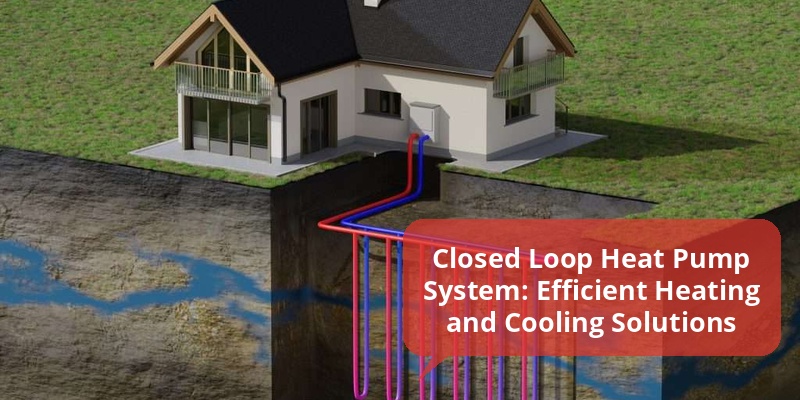Closed loop heat pump systems represent an innovative, energy-efficient option for heating and cooling homes and commercial spaces. These systems operate by circulating a refrigerant or water-antifreeze solution through a continuous loop buried underground or submerged in water sources. This loop exchanges heat with the earth, which maintains a relatively stable temperature year-round. The technology reduces reliance on fossil fuels and offers consistent performance in various climates.
| Aspect | Description |
|---|---|
| System Type | Ground source heat pump with closed loop design |
| Heat Exchange Medium | Water or refrigerant mixture in buried pipes |
| Installation Methods | Horizontal, vertical, or submerged loop configurations |
| Energy Efficiency | Up to 400% efficient, reducing operational costs |
| Applications | Residential, commercial, and industrial heating and cooling |
| Environmental Impact | Low emissions and sustainable energy use |
What Is a Closed Loop Heat Pump System?
A closed loop heat pump system is a geothermal technology that leverages the steady temperature of the ground or water source to provide efficient heating and cooling. The system involves a sealed piping loop buried underground or submerged in a body of water. A fluid—the heat transfer medium—circulates through this closed loop, absorbing or dissipating heat depending on the season. Inside the building, the heat pump extracts or injects heat from this loop, distributing comfortable air or hot water.
This closed loop contrasts with open loop systems that draw groundwater directly before returning it, making closed loops cleaner and more sustainable, with minimal environmental intrusion.
How Closed Loop Heat Pump Systems Work
The main components of a closed loop heat pump system include the ground loop piping, heat pump unit, and distribution system.
Ground Loop Piping
The ground loop is typically made of high-density polyethylene (HDPE) pipes buried horizontally or vertically, or placed underwater. These pipes contain a water and antifreeze solution, which circulates continuously to absorb thermal energy from the ground during winter and dissipate excess heat during summer.
Heat Pump Unit
The heat pump inside the building acts as a heat exchanger. It compresses the refrigerant to concentrate heat for heating mode or expands it to remove heat for cooling mode. The heat pump transfers thermal energy between the building and the fluid circulating in the ground loop.
Distribution System
Inside the property, the heat extracted or absorbed is circulated via forced air ducts, radiant floor heating, or hydronic systems. This enables efficient delivery of heating or cooling tailored to occupant needs.
Types of Closed Loop Configurations
Closed loop heat pump systems come with variable loop designs, chosen based on site conditions, land availability, and climate.
- Horizontal Loop: Pipes are buried in shallow trenches, ideal for properties with adequate land space. It is typically the least expensive but requires more area.
- Vertical Loop: Pipes are drilled vertically deep into the ground, suitable for limited land spaces or rocky soil. Installation costs are higher but ground temperatures are more stable.
- Pond/Lake Loop: Pipes are coiled and submerged in a nearby water body with consistent temperatures. This environment offers excellent heat exchange efficiency if a suitable water source exists.
Benefits of Closed Loop Heat Pump Systems
Closed loop heat pumps provide numerous advantages:
- High Energy Efficiency: These systems deliver up to four times the energy consumed, significantly reducing utility bills.
- Environmentally Sustainable: By utilizing natural ground or water heat, they minimize greenhouse gas emissions.
- Low Operating Costs: They consume less electricity compared to conventional HVAC systems, resulting in long-term savings.
- Durability and Longevity: Underground loops typically last 50+ years with minimal maintenance.
- Quiet and Reliable: These pumps operate quietly and maintain comfortable indoor climates year-round.
Installation Considerations and Costs
Installing a closed loop heat pump involves several considerations for optimal performance:
- Site Assessment: Soil condition, land availability, and proximity to water sources impact loop design.
- Loop Configuration Choice: Whether horizontal, vertical, or pond/lake loop depends on geography and budget.
- System Size: Proper sizing requires heating and cooling load calculations to match building needs.
- Installation Costs: Typically range between $20,000 and $40,000 depending on system size and loop type.
- Incentives and Rebates: Federal, state, and local incentives can offset upfront costs.
Energy Savings and Environmental Impact
Closed loop heat pump systems reduce dependence on fossil fuels by leveraging renewable geothermal energy. According to the U.S. Environmental Protection Agency, geothermal heat pumps can reduce energy consumption—and related emissions—by up to 44% compared to air-source heat pumps and conventional heating methods.
The consistent underground temperature enables more efficient heat transfer, minimizing energy waste in both heating and cooling seasons. Moreover, closed loop systems eliminate water usage and discharge linked to open loop designs, further enhancing environmental benefits.
Maintenance and Longevity
Closed loop heat pump systems require minimal upkeep due to the sealed, underground loops and durable materials.
- Regular Checks: Annual inspection of peripherals like filters, pumps, and refrigerant levels ensures functionality.
- Loop Integrity: Pipes are corrosion-resistant and protected underground, rarely needing replacement.
- System Lifespan: Heat pumps generally last 20-25 years; loops can last 50+ years.
- Professional Servicing: Engaging certified technicians helps maintain efficiency and extend equipment life.
Applications of Closed Loop Heat Pump Systems
These systems are versatile and can be effectively deployed in various settings:
- Residential Buildings: Single-family homes benefit from reduced energy bills and year-round comfort.
- Commercial Properties: Offices, retail spaces, and warehouses gain reliable climate control with lower operating costs.
- Industrial Use: Some manufacturing processes benefit from stable temperature regulation through geothermal systems.
- New Construction and Retrofits: Closed loop heat pumps can serve both new buildings and existing structures aiming for energy upgrades.
